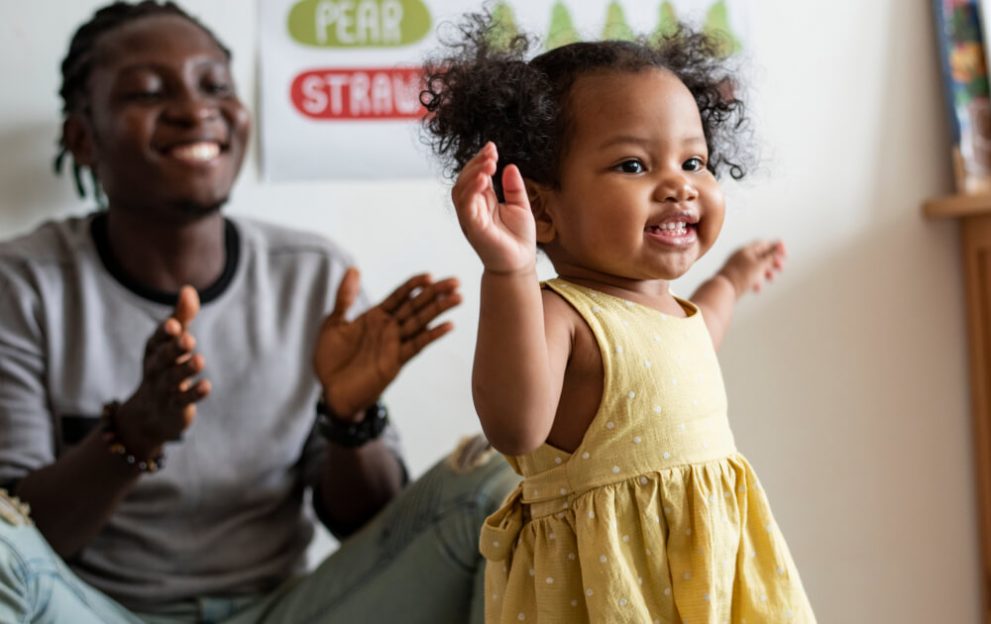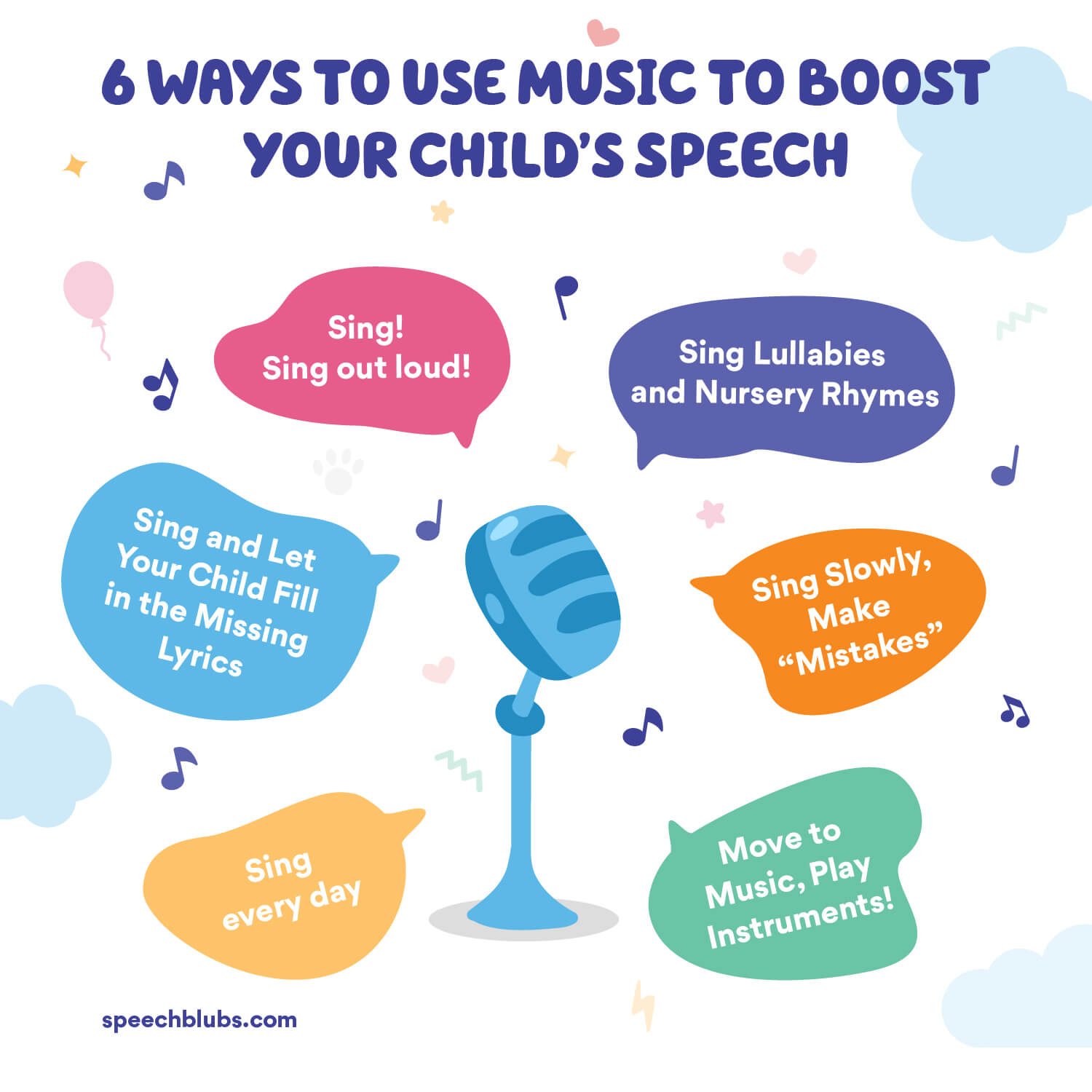Music Elevates Your Child’s Speech Development
Feb 6, 2022 You can listen to an instrumental piece of music and immediately know the intended emotion, movements, and message. You can use musical instruments to effectively convey your feelings, create an atmosphere, and/or deliver a story. Why? Because music is communication.
Research studies and medical professions are in agreement that music is a great aid for learning and memory. I can belt out every word of popular 90’s tunes and chant phone numbers from insurance adverts, yet I struggle to recall the phone number of my local pharmacy (despite using it several times) or remember the groceries that I’ve JUST written down on a shopping list and then inconveniently left at home. Yes, music is powerful, which is the reason why it is often used as therapy.
It is also the reason why we have children songs in the Speech Blubs app. Start with Speech Blubs app to teach the little ones some happy upbeat songs from the “Sing Along” section. Listen to Speech Blubs’ Learning Songs for Kids:
Boost Your Child’s Speech Development!
Improve language & communication skills with fun learning!

But How Does This Help Children Develop Language?
Well, right from birth, children love to listen to music and rhythm. This doesn’t matter if it’s signing nursery rhymes, lullabies, reading a story/poem, shaking instruments, or simply talking to them. Babies and young children tune into the intonations, rhythm, and speech patterns. In doing this, you make the interaction between you and your child a ‘whole brain experience.’

Music stimulates the brain, which is ready for learning and boosting language development (here comes the science . . .), because music and linguistics share a neurological network. This kind of network is made up of nerve cells in the brain called ‘neurons.’ These neurons use electrical and chemical impulses to transmit and process information in the brain. Music fires up these neurons and engages many parts of the brain, which increases synaptic growth. Therefore, musical experience is like exercise for the brain. This is essential for learning, focus, memory, and language. As an added bonus, music results in the brain releasing hormones for happiness called ‘dopamine’ – and happy brains make for better learners!
So Now You Know How Music Helps Language Develop, but What Can You Do?
Sing!!!!! Sing out loud. Sing slowly. Sing every day. It really doesn’t matter if you’re out of tune or make up your own tunes . . . just sing to your child.
Singing nursery rhymes and lullabies on a regular basis are proven to enhance language acquisition and communication skills.
Children develop a sense of syntax (word order), vocabulary knowledge, and speech patterns every time you sing.
These patterns are often repetitive, engaging, and designed for young children to learn vocabulary, grammar, and speech pronunciation. Children engage and respond to music from an early age, so singing is a great opportunity for your child to develop and practice pre-language skills including the imitation of actions and words, eye contact, vocal play, understanding timing, attention, listening, and understanding verbal (lyrics) and non-verbal (actions) language.
Sing slowly so that your child can learn the actions, words, and rhythm at their own pace and can join in easily. This also gives your child time to anticipate what will come next.
Let Your Child Fill in the Missing Words!
As your child becomes familiar with nursery rhymes and songs, pause and wait for them to fill the gap with a gesture, noise, or the word. Immediately respond to your child’s attempt to fill in the gap and watch carefully as it may be as subtle as a smile or expectant look for you to carry on.
For example, sing the first few words: “Twinkle twinkle little . . .” then wait . . . count to 10 in your head if you need to.
Waiting gives your child the opportunity to interact and communicate with you, developing essential early social skills such as turn-taking and eye contact.
Have fun and be silly by making “mistakes” and signing the wrong words, wait for your child’s reaction and laugh together. Children often enjoy this game and want the “mistake” repeating over and over again. Chances are that you’ll be bored of this before they are, but keep it going . . . repetition is a great way for your child to practice new skills and communicate.
Making Music with Kids: Noise or Learning?
Moving to music, playing instruments (these can be homemade), and using props or puppets also gives children of all ages a chance to improve their gross and fine motor skills, as well as bringing objects, stories, and imagination to life.
Music-making activities are so much more than just noise. Shaking bells, banging on pan lids with wooden spoons, and tapping on tables is your child’s way of expressing their ideas and emotions, exploring their creativity, and developing auditory processing and listening skills.
As an extra benefit moving to music counts towards the recommended three hours a day of physical activity, helps children to learn about their own bodies, and improves balance, spatial awareness, coordination, and fitness.
Combining music and movement engages most of our senses and leads to a more positive and successful learning experience. Adding music and movement to everyday tasks such as bath time or story time can lead to many learning and interaction opportunities, as well as increased understanding about routines.
Try singing your actions such as, “this is the way we brush our teeth/wash our face/wash our hands/put on socks” to the tune of ‘Mulberry Bush’ for happier (and more cooperative) daily tasks.
The Wonderful Thing about Music is . . .
It’s an all-round multi-sensory experience as children can touch, listen, see, move, and join in to enhance language, musical, and physical abilities. Let’s not forget the impact on well-being too, as the brain releases dopamine (that happy hormone) during every musical experience.
So what are you waiting for?! Grab your spoons and pan lids, dance, sing, be happy, and let’s make some noise together to help all children communicate and learn.

